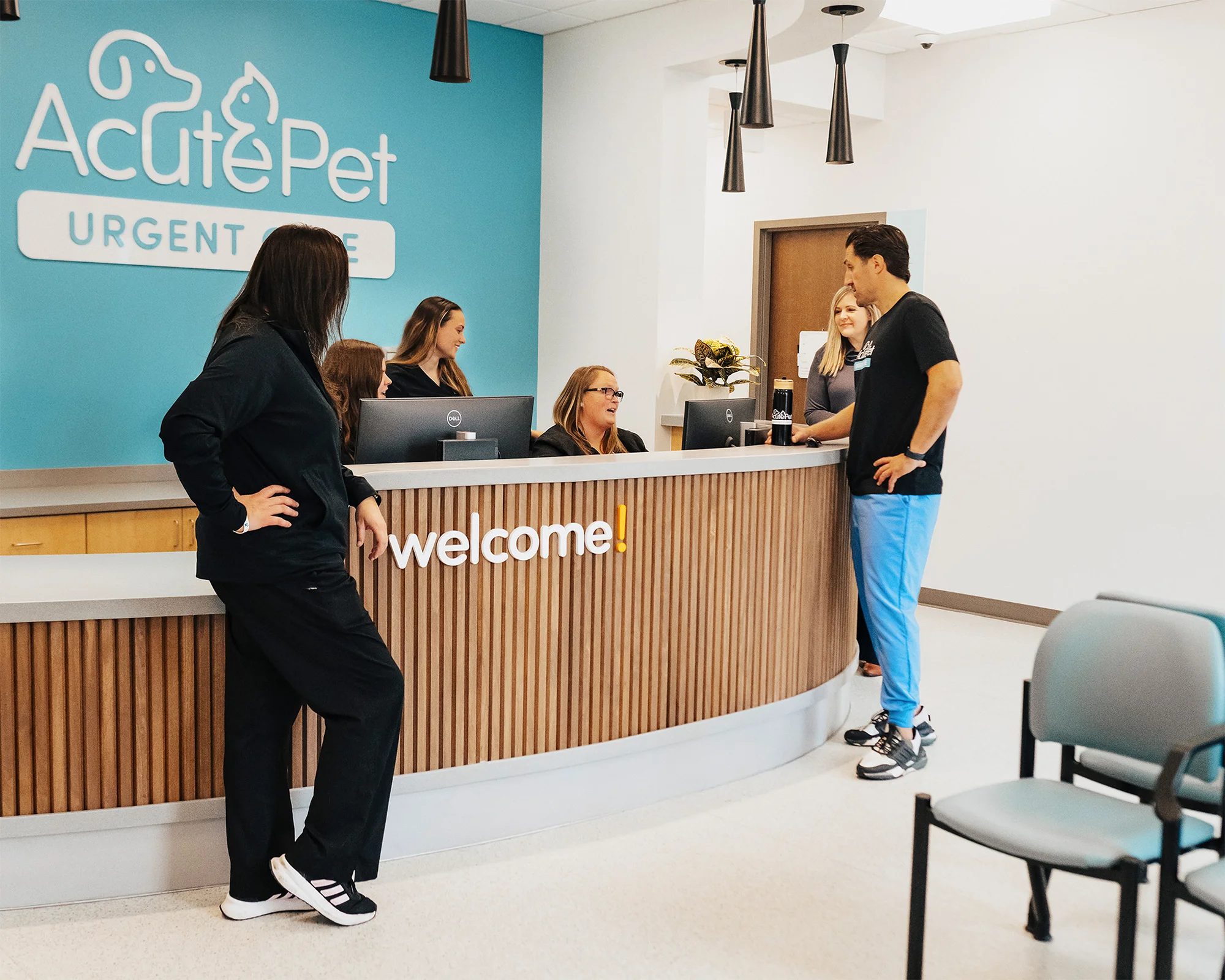caring for pets,
supporting pet owners.

what to expect at AcutePet Urgent Care

what we treat
Need a same-day appointment? Book online, call ahead, or just walk-in. Not sure if we treat something? No problem – give us a call.
- Digestive issues
- Flea allergy or infestation
- Hives
- Insect bites or bee stings
- Itching/Scratching
- Licking/Chewing affected area
- Red, irritated skin
- Rubbing face
- Runny eyes or nose
- Skin irritation or infection
- Snake Bites
- Sneezing
- Swelling of face, ears, lips, ocular area
- Vaccine sensitivity or reaction
- Discomfort
- Licking
- Scooting
- Hiding
- Lethargy/Decreased Activity
- Allergic conditions
- Foreign object inhalation
- Lower respiratory irritation, virus or disease
- Upper respiratory irritation, virus or disease
- Cremation
- Euthanasia
- Discharge
- Discomfort
- Infections
- Redness
- Swelling
Some pets maintain a baseline temperature slightly above or below these ranges.
- Cats – the normal body temperature is between 100.5 and 102.5 degrees F.
- Dogs – the normal body temperature is between 99.5 and 102.5 degrees F.
- Change in appetite – not eating or drinking, or excessive eating or drinking
- Constipation
- Dehydration
- Diarrhea
- Dietary indiscretion
- Foreign material ingestion
- Intestinal parasites (worms)
- Lethargy
- Regurgitation
- Vomiting
- Broken toenail
- Lameness/Limping
- Possible broken bone/Fracture assessment
- Trouble/Difficulty walking
- Wounds, lacerations (cuts), abrasions (scrapes), abscesses
- Assistance in administration of prescribed medications
- Subcutaneous fluid administration
Animals are often very good at concealing any discomfort, and it may be shown in less obvious ways, like slight changes in behavior, activity, or body language.
- Arthritis
- Back Injury/Pain
- Neurologic
- Oncologic (cancer related)
- Orthopedic (bone, joint, muscular)
- Hot spots
- Itching
- Masses or lumps
- Rashes
Quick intervention is usually indicated for most accidental ingestions or exposures, and may include induction of vomiting, decontamination or administration of binding agents, supportive care, or medications.
- Chemical substances or compounds
- Medications (human or veterinary)
- Overdoses
- Plants
- Medication side effect or overdose
- Metabolic disease or disorder
- Neurological disease or disorder
- Toxin exposure or ingestion
- Bloody urine
- Dehydration
- Increased frequency
- Straining or difficulty urinating
- Urinary tract infection
You know your pet best – sometimes it is hard to determine exactly what is bothering them, but you know they just aren’t themselves. This can be your pet’s way of letting you know they aren’t feeling well or are sick.
- Change in activity level
- Change in appetite
- Change in behavior
- Hiding
As a facility providing urgent care for family pets, we prioritize the safety of our patients and their families. Therefore, we are unable to treat stray animals or wildlife.

payment options
We understand that pet emergencies can arise unexpectedly, and we’re here to support you during those stressful times. At AcutePet, we offer a variety of payment options to help manage unplanned expenses related to your pet’s care.
We accept cash, credit cards, All Pet Card, and Care Credit to ensure you have the flexibility you need when it matters most.
FAQs
You should bring your pet to urgent care when they need to be seen by a veterinarian quickly, or need care the same day. AcutePet offers emergency-level care 7 days a week from 10 am to 10 pm, with shorter wait times, lower cost, and less stress than a traditional ER.
If your pet needs care overnight or has a critical condition, it’s best to go to a 24 hour pet emergency hospital.
We provide care for dogs and cats.
During your visit, we will discuss with you the best options for treatment for you and your pet. If overnight care or hospitalization is needed, we will assist you with the transfer to a 24/7 pet emergency hospital.
Yes, but we recommend booking an appointment online or calling ahead. Walk-ins are welcome but be aware there may be a slight wait.
We have abbreviated hours 10 am – 4 pm for Memorial Day, Independence Day, Labor Day, and New Year’s Eve. We are closed on Thanksgiving, Christmas Eve, and Christmas Day.
Payment is due at the time of service.
We accept cash, check, credit cards, All Pet Card and CareCredit.
As a pet urgent care, we are not able to offer payment plans.
We recommend reviewing your provider’s policy ahead of time, so you are familiar with their policies for submitting a claim and payment for services. Most policies reimburse the pet owner for services after a claim is submitted. We are happy to provide any necessary documentation to aid in the submission of claims.
We strive to offer affordable, same-day emergency care for all pets and clients. At this time, we do not offer discounts to specific groups.
Yes, we do offer end-of-life care. Our locations have a comfort room available for privacy during this difficult time.
We do not offer wellness plans or routine vaccines. Wellness care is better suited for your primary care veterinarian.
We cannot fill or refill prescriptions from other veterinarians or veterinary hospitals. After a full examination, patients seen at AcutePet may be prescribed medications from our in-hospital pharmacy or provided with a written prescription. For any ongoing or refill medications, please follow up with your primary care veterinarian.
